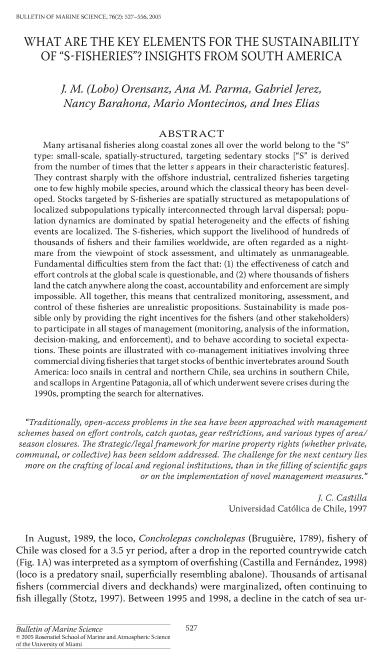Mostrar el registro sencillo del ítem
dc.contributor.author
Orensanz, Jose Maria

dc.contributor.author
Parma, Ana María

dc.contributor.author
Jerez, Gabriel
dc.contributor.author
Barahona, Nancy
dc.contributor.author
Montecinos, Mario
dc.contributor.author
Elias, Ines

dc.date.available
2020-06-10T19:24:45Z
dc.date.issued
2005-12
dc.identifier.citation
Orensanz, Jose Maria; Parma, Ana María; Jerez, Gabriel; Barahona, Nancy; Montecinos, Mario; et al.; What are the key elements for the sustainability of "S fisheries"? Insights from South America; Rosenstiel School of Marine and Atmospheric Science; Bulletin of Marine Science; 12-2005; 527-556
dc.identifier.issn
0007-4977
dc.identifier.uri
http://hdl.handle.net/11336/107225
dc.description.abstract
Many artisanal fisheries along coastal zones all over the world belong to the “S” type: small-scale, spatially-structured, targeting sedentary stocks [“S” is derived from the number of times that the letter s appears in their characteristic features]. They contrast sharply with the offshore industrial, centralized fisheries targeting one to few highly mobile species, around which the classical theory has been developed. Stocks targeted by S-fisheries are spatially structured as metapopulations of localized subpopulations typically interconnected through larval dispersal; population dynamics are dominated by spatial heterogeneity and the effects of fishing events are localized. The S-fisheries, which support the livelihood of hundreds of thousands of fishers and their families worldwide, are often regarded as a nightmare from the viewpoint of stock assessment, and ultimately as unmanageable. Fundamental difficulties stem from the fact that: (1) the effectiveness of catch and effort controls at the global scale is questionable, and (2) where thousands of fishers land the catch anywhere along the coast, accountability and enforcement are simply impossible. All together, this means that centralized monitoring, assessment, and control of these fisheries are unrealistic propositions. Sustainability is made possible only by providing the right incentives for the fishers (and other stakeholders) to participate in all stages of management (monitoring, analysis of the information, decision-making, and enforcement), and to behave according to societal expectations. These points are illustrated with co-management initiatives involving three commercial diving fisheries that target stocks of benthic invertebrates around South America: loco snails in central and northern Chile, sea urchins in southern Chile, and scallops in Argentine Patagonia, all of which underwent severe crises during the 1990s, prompting the search for alternatives.
dc.format
application/pdf
dc.language.iso
eng
dc.publisher
Rosenstiel School of Marine and Atmospheric Science

dc.rights
info:eu-repo/semantics/openAccess
dc.rights.uri
https://creativecommons.org/licenses/by-nc-sa/2.5/ar/
dc.subject
FISHERIES MANAGEMENT
dc.subject
ARTESANAL FISHERIES
dc.subject.classification
Ecología

dc.subject.classification
Ciencias Biológicas

dc.subject.classification
CIENCIAS NATURALES Y EXACTAS

dc.title
What are the key elements for the sustainability of "S fisheries"? Insights from South America
dc.type
info:eu-repo/semantics/article
dc.type
info:ar-repo/semantics/artículo
dc.type
info:eu-repo/semantics/publishedVersion
dc.date.updated
2020-05-15T15:56:27Z
dc.journal.pagination
527-556
dc.journal.pais
Estados Unidos

dc.description.fil
Fil: Orensanz, Jose Maria. Consejo Nacional de Investigaciones Científicas y Técnicas. Centro Científico Tecnológico Conicet - Centro Nacional Patagónico; Argentina
dc.description.fil
Fil: Parma, Ana María. Consejo Nacional de Investigaciones Científicas y Técnicas. Centro Científico Tecnológico Conicet - Centro Nacional Patagónico. Centro para el Estudio de Sistemas Marinos; Argentina. Consejo Nacional de Investigaciones Científicas y Técnicas. Centro Científico Tecnológico Conicet - Centro Nacional Patagónico; Argentina
dc.description.fil
Fil: Jerez, Gabriel. Instituto de Fomento Pesquero; Chile
dc.description.fil
Fil: Barahona, Nancy. Instituto de Fomento Pesquero; Chile
dc.description.fil
Fil: Montecinos, Mario. Instituto de Fomento Pesquero; Chile
dc.description.fil
Fil: Elias, Ines. Consejo Nacional de Investigaciones Científicas y Técnicas. Centro Científico Tecnológico Conicet - Centro Nacional Patagónico; Argentina
dc.journal.title
Bulletin of Marine Science

dc.relation.alternativeid
info:eu-repo/semantics/altIdentifier/url/https://www.ingentaconnect.com/content/umrsmas/bullmar/2005/00000076/00000002/art00017
Archivos asociados
